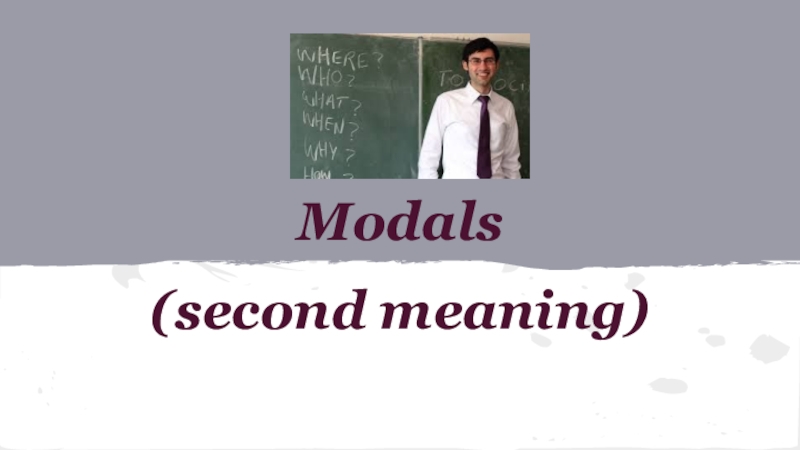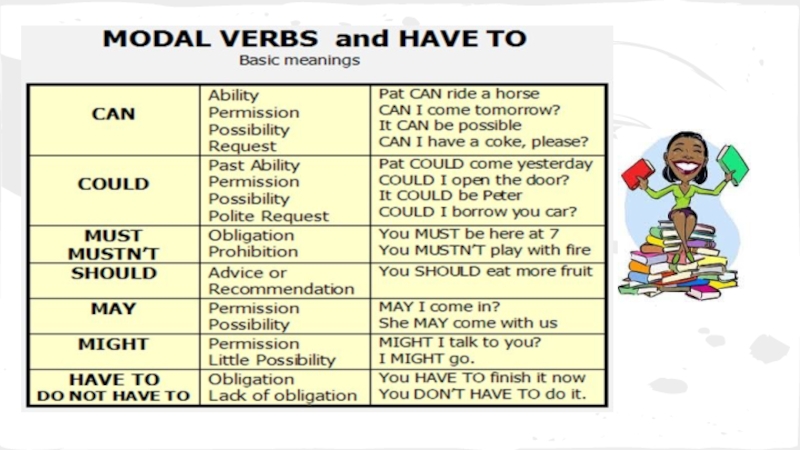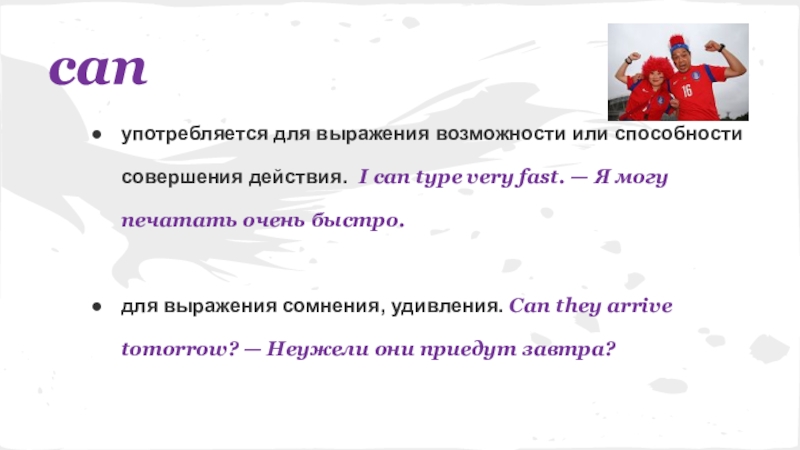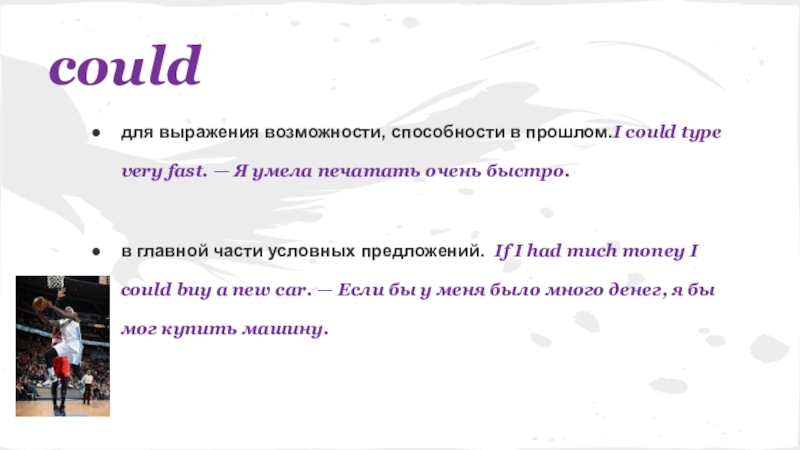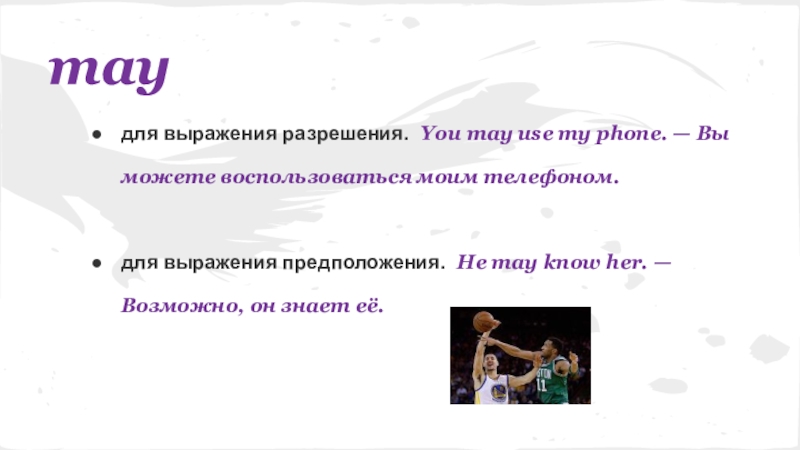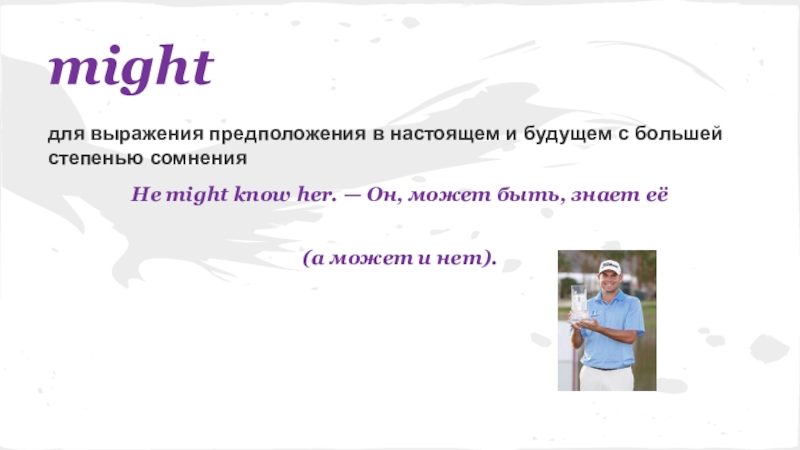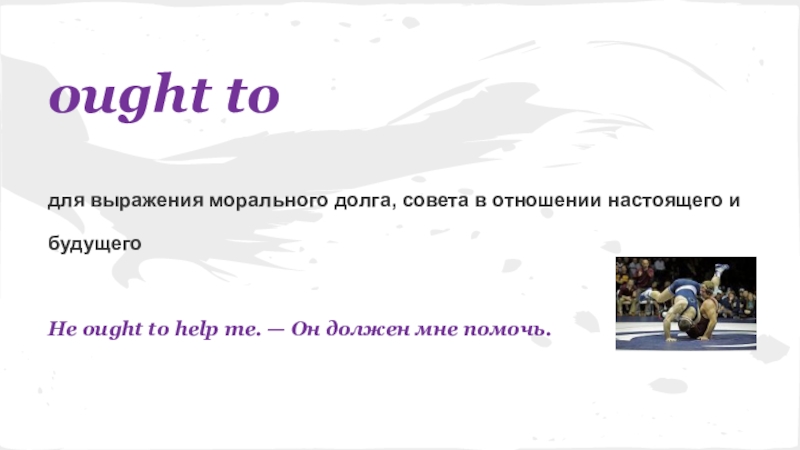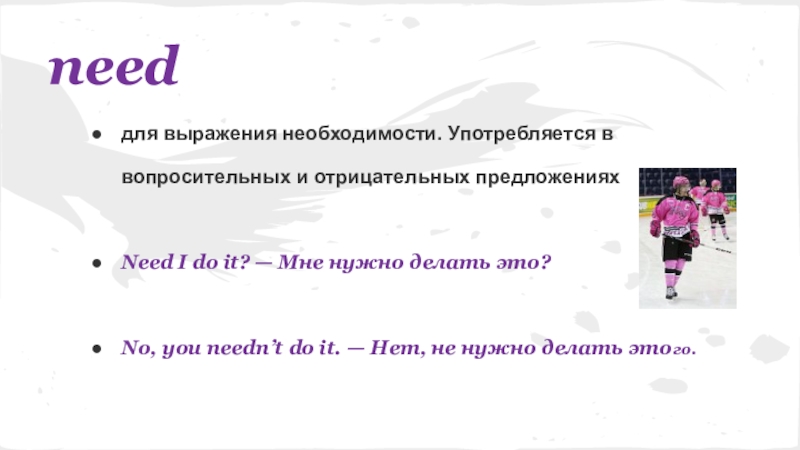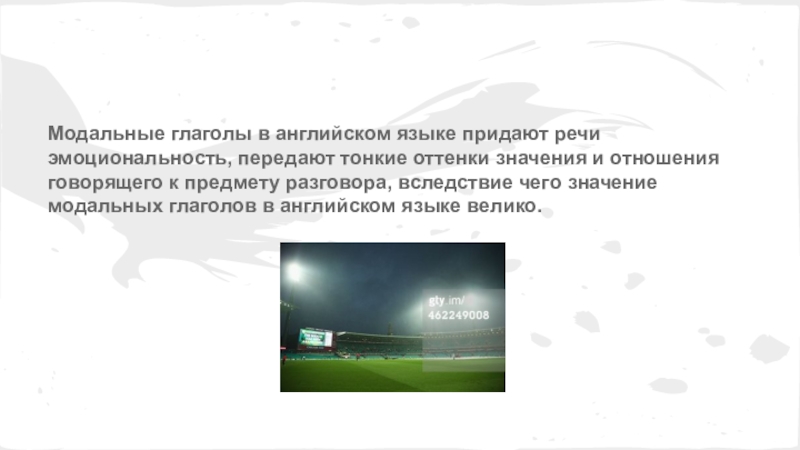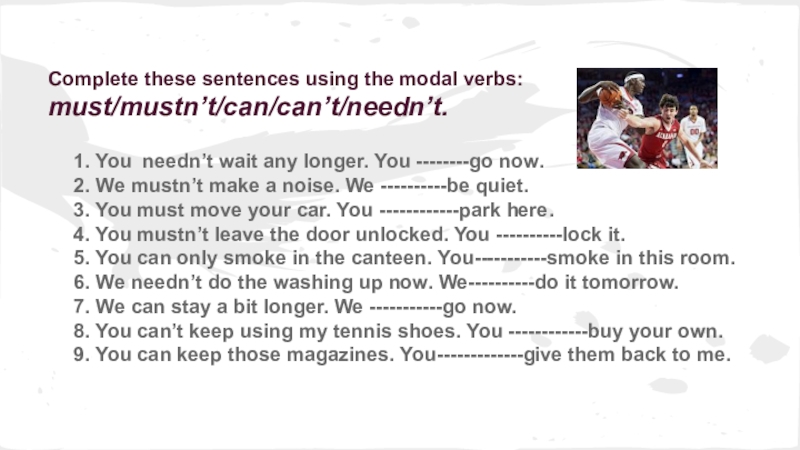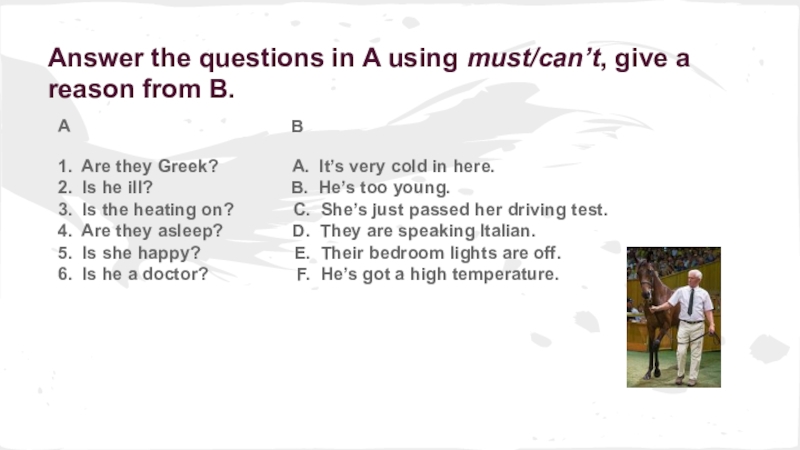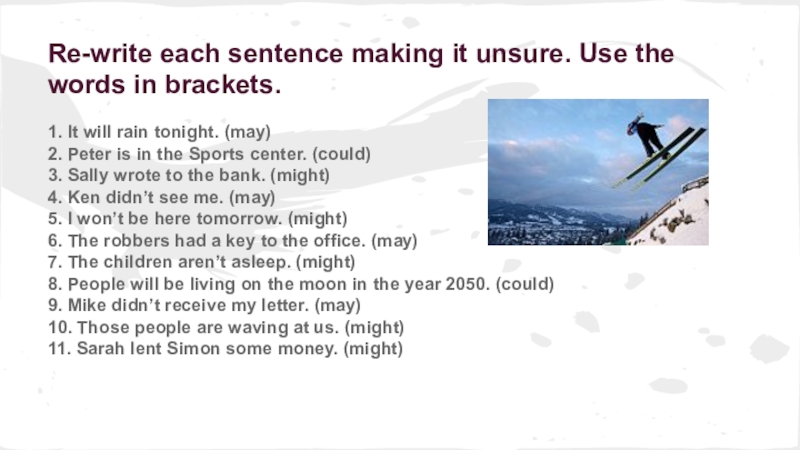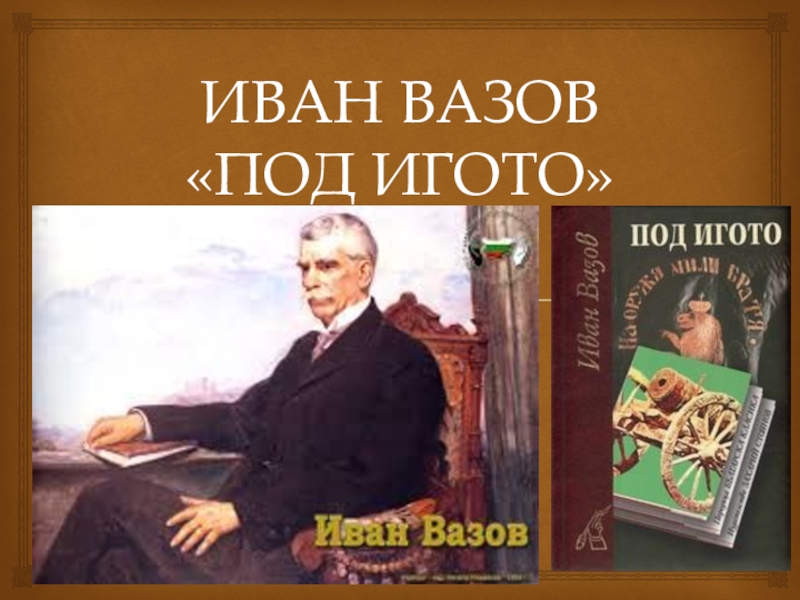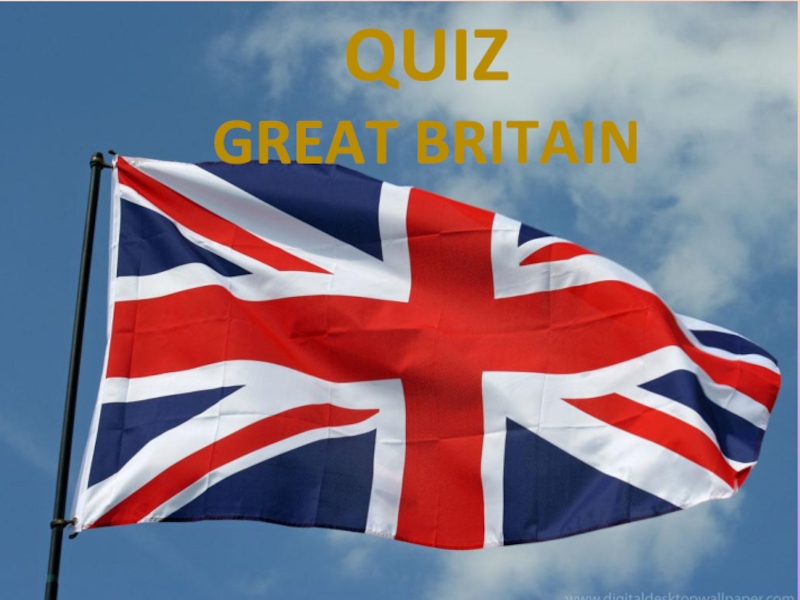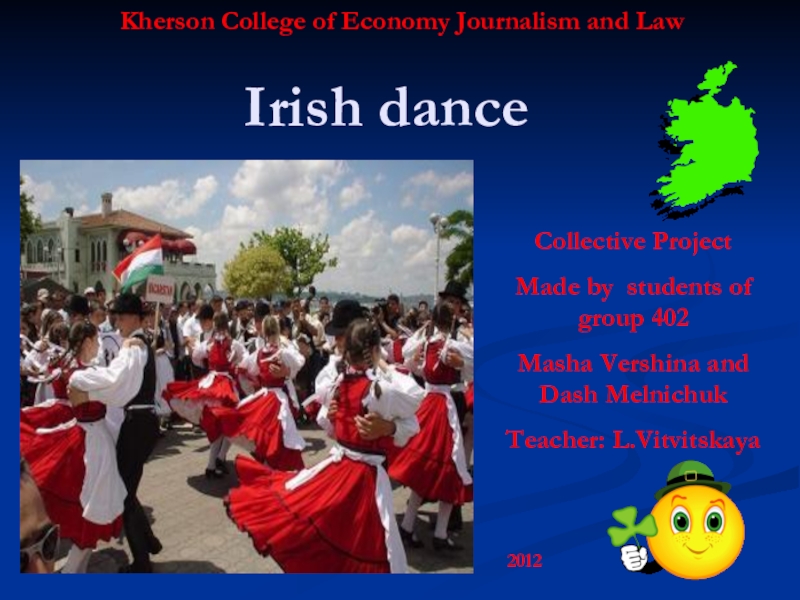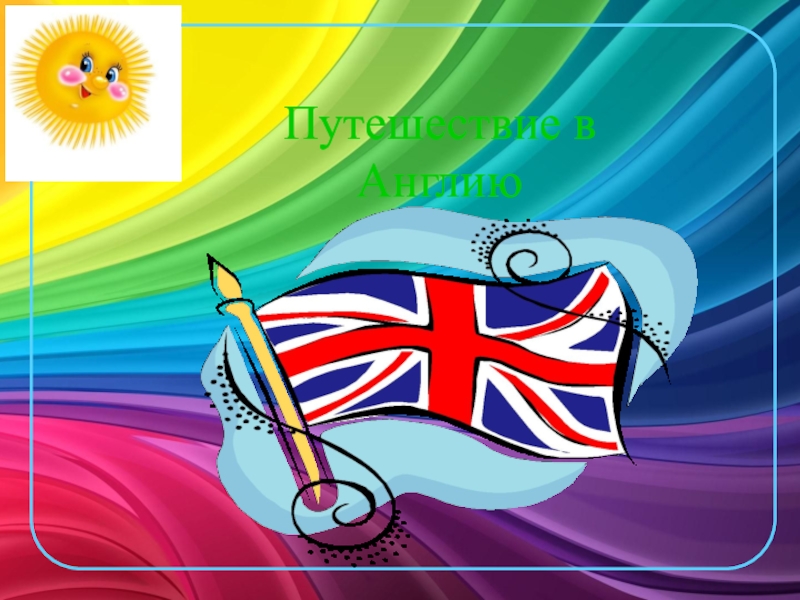- Главная
- Разное
- Образование
- Спорт
- Естествознание
- Природоведение
- Религиоведение
- Французский язык
- Черчение
- Английский язык
- Астрономия
- Алгебра
- Биология
- География
- Геометрия
- Детские презентации
- Информатика
- История
- Литература
- Математика
- Музыка
- МХК
- Немецкий язык
- ОБЖ
- Обществознание
- Окружающий мир
- Педагогика
- Русский язык
- Технология
- Физика
- Философия
- Химия
- Шаблоны, фоны, картинки для презентаций
- Экология
- Экономика
Презентация, доклад по английскому языку на тему Modals (second meaning)
Содержание
- 1. Презентация по английскому языку на тему Modals (second meaning)
- 2. Слайд 2
- 3. can употребляется для выражения возможности или способности
- 4. couldдля выражения возможности, способности в прошлом.I could
- 5. may для выражения разрешения. You may use
- 6. might для выражения предположения в настоящем и
- 7. mustдля выражения долженствования. You must do it.
- 8. ought to для выражения морального долга, совета
- 9. needдля выражения необходимости. Употребляется в вопросительных и
- 10. have toShe had to go there. — Ей пришлось поехать туда.
- 11. shouldTom shouldn’t have done it. — Тому
- 12. Модальные глаголы в английском языке придают речи
- 13. Choose the correct form. 1. You mustn’t/don’t
- 14. Complete these sentences using the modal verbs:
- 15. Rephrase these sentences using the modal verbs
- 16. Answer the questions in A using must/can’t,
- 17. Re-write each sentence making it unsure. Use
Слайд 3can
употребляется для выражения возможности или способности совершения действия. I can
для выражения сомнения, удивления. Can they arrive tomorrow? — Неужели они приедут завтра?
Слайд 4could
для выражения возможности, способности в прошлом.I could type very fast. —
в главной части условных предложений. If I had much money I could buy a new car. — Если бы у меня было много денег, я бы мог купить машину.
Слайд 5may
для выражения разрешения. You may use my phone. — Вы
для выражения предположения. He may know her. — Возможно, он знает её.
Слайд 6might
для выражения предположения в настоящем и будущем с большей степенью
He might know her. — Он, может быть, знает её
(а может и нет).
Слайд 7must
для выражения долженствования. You must do it. — Ты должен сделать
для выражения предположения. It must be him. — Это должно быть он.
для выражения запрета. You musn’t touch it. — Тебе запрещается трогать это.
Слайд 8ought to
для выражения морального долга, совета в отношении настоящего и
He ought to help me. — Он должен мне помочь.
Слайд 9need
для выражения необходимости. Употребляется в вопросительных и отрицательных предложениях
Need I do
No, you needn’t do it. — Нет, не нужно делать этого.
Слайд 11should
Tom shouldn’t have done it. — Тому не следовало делать этого.
Tom
Слайд 12Модальные глаголы в английском языке придают речи эмоциональность, передают тонкие оттенки
Слайд 13Choose the correct form.
1. You mustn’t/don’t have to open
2. You’ve been late for work twice this week. You mustn’t/needn’t be late again tomorrow.
3. We mustn’t/don’t have to hurry. We’ve got plenty of time.
4. We mustn’t /haven’t got to make any noise going into the house. It’s very late and everybody is asleep.
5. You mustn’t /needn’t tell Nicki about the party. I’ve already told her.
6. You mustn’t/don’t need to phone the station about the time of the trains. I’ve got a timetable.
7. I mustn’t/haven’t got to go now. I can stay a bit longer if you want me to.
Слайд 14Complete these sentences using the modal verbs: must/mustn’t/can/can’t/needn’t.
1.
2. We mustn’t make a noise. We ----------be quiet.
3. You must move your car. You ------------park here.
4. You mustn’t leave the door unlocked. You ----------lock it.
5. You can only smoke in the canteen. You-----------smoke in this room.
6. We needn’t do the washing up now. We----------do it tomorrow.
7. We can stay a bit longer. We -----------go now.
8. You can’t keep using my tennis shoes. You ------------buy your own.
9. You can keep those magazines. You-------------give them back to me.
Слайд 15Rephrase these sentences using the modal verbs in brackets.
1. Perhaps she
2. Perhaps they went out. (might)
3. Perhaps you are right. (could)
4. Perhaps she’ll win the race. (might)
5. Perhaps she forgot about the meeting.(may)
6. Perhaps they were asleep. (might)
7. Perhaps he doesn’t know the address. (may)
8. Perhaps they left early.(could)
Слайд 16Answer the questions in A using must/can’t, give a reason from
A B
1. Are they Greek? A. It’s very cold in here.
2. Is he ill? B. He’s too young.
3. Is the heating on? C. She’s just passed her driving test.
4. Are they asleep? D. They are speaking Italian.
5. Is she happy? E. Their bedroom lights are off.
6. Is he a doctor? F. He’s got a high temperature.
Слайд 17Re-write each sentence making it unsure. Use the words in brackets.
1. It will rain tonight. (may)
2. Peter is in the Sports center. (could)
3. Sally wrote to the bank. (might)
4. Ken didn’t see me. (may)
5. I won’t be here tomorrow. (might)
6. The robbers had a key to the office. (may)
7. The children aren’t asleep. (might)
8. People will be living on the moon in the year 2050. (could)
9. Mike didn’t receive my letter. (may)
10. Those people are waving at us. (might)
11. Sarah lent Simon some money. (might)
